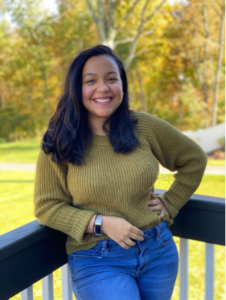Educators across the nation have noticed the success of youth mentoring programs that emphasize the need for mentors who share similar stories as the youth they work with. We at the Center for Youth and Community Leadership in Education (CYCLE) experienced it first-hand this year at the different Youth Action Researchers at the Intersection (YARI) convenings. The youth researchers, all of whom come from marginalized communities, were supported in their research by adult academic researchers.
At KnowledgeWorks’ Student-Centered Learning Research Collaborative’s virtual convening in May, one session brought together YARI youth researchers with a group of majority white adult researchers who gave feedback to the youth on their research projects. Immediately, support staff noticed there was a gap and lack of similar background experiences between the youth and adult researchers, and the conversation was geared more toward technical and academic feedback.
Academia often prioritizes credentials and data that inform research rather than uplifting the lived experience of people, especially those from marginalized communities. As an adult ally, I observed an imbalance of engagement dynamics where the KnowledgeWorks adult cohort was heavily engaged while the youth researchers had their cameras off and extensive dialogue did not come into fruition.
After this convening, the YARI support team had a meeting to debrief where we reflected on why the young people had their cameras off and why they remained quiet for most of the time. There were a few factors that could contribute to these actions and some we can’t anticipate, such as what may be happening in their homes. However, we knew that we could better plan the content of the event and the demographics of the participants to ensure it was youth-centered and fit their needs. We reflected on who and what would bring out the higher level of engagement. Many national research and practices suggest young people in the demographics we serve through YARI benefit from people who share similar life experiences and look like them.
In an ageist world that values academia over real-life personal experience, it is so important for those of us doing this work to actively address and dismantle it when we see it play before our eyes. As adults working towards equity and justice, we’re only here to remove the burdens that are in the way of their chosen path.
As someone who has worked with young people for nearly 10 years, especially those coming from low income and/or communities of color, I have found it’s important to always create spaces where not only both adults and youth can be vulnerable, but where adults actively take a step back and allow youth to bloom. Oftentimes, young people from marginalized communities don’t get the opportunity to participate in research projects. In an ageist world that values academia over real-life personal experience, it is so important for those of us doing this work to actively address and dismantle it when we see it play before our eyes. As adults working towards equity and justice, we’re only here to remove the burdens that are in the way of their chosen path.
It’s such a beautiful thing when it happens right before our eyes, and it did – our youth were so thankful that KnowledgeWorks addressed these issues and included more researchers who looked like them for an additional convening in August. This group of researchers showed us how their different identities and the communities they are from have influenced what kinds of research they wanted to do and the topics they study.
This time, most of our youth had their cameras on, engaged in Q and A and reported back saying they were satisfied with this interaction. This group of adult researchers was made up of mostly professionals of color who shared similar stories and knew when to step up to be an example and when to step back to let them be experts in their own stories.
The 2020 YARI cohort is composed of nine students from the MET High School in RI. Most of these students identify as youth of color, with a learning difference and/or from a low-income household. Most have chosen to focus their research on how their identities intersect and impact their experiences in the education system.
This blog is part of the Student-Centered Learning Research Collaborative’s ‘Youth Action Researchers at the Intersection’ project.

Vianna Mercedes, Program Associate
Vianna’s role at CYCLE involves the support of youth organizing and research projects. Currently, she is playing key roles for the Youth Leadership Institute (YLI), New England Youth Organizing Network (NEYON), and Counselors Not Cops research report. Previously, her work involved leading youth development and mental health initiatives focusing on traditionally underrepresented communities in Massachusetts. Vianna received a BS in Sociology and Global Studies and MS in Non-Profit Management from Worcester State University.